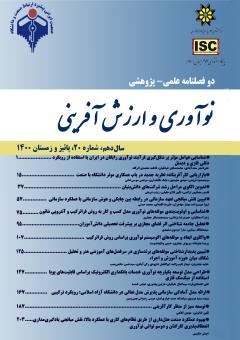تحلیل جامعه شناختی اثر فضای مجازی بر پیشرفت تحصیلی دانش آموزان
محورهای موضوعی : Special
سیدعطالله سینائی
1
![]() ,
سارا موسوی مشهدی
2
,
سارا موسوی مشهدی
2
1 -
2 - کارشناس ارشد مدیریت رسانه، تهران، ایران
کلید واژه: شبکه های اجتماعی, فضای مجازی, انگیزه پیشرفت, دانش آموزان دختر سال اول متوسطه ناحیه دو آموزش و پرورش شهر مشهد,
چکیده مقاله :
گسترش روز افزون کاربرد فناوری های دیجیتال باعث شده است که فضای مجازی و شبکه های اجتماعی به بخش مهمی از زندگی روزمره افراد تبدیل شود. بعلاوه فناوری های دیجیتال و فضای مجازی موجب دگرگونی ابزار، روش ها و محتوای یادگیری در نظام های آموزش و پرورش شده اند. همزمان بررسی ابعاد و آثار کاربرد گسترده فناورهای ارتباطی و اطلاعاتی، از آغاز مورد توجه محققان بوده است و پژوهش حاضر نیز چنین هدفی را دنبال می کند. این پژوهش، با روش تحقیق همبستگی و با ابزار پرسشنامه اجرا شده است. جامعه آماری شامل تمام دانش آموزان دختر سال اول دوره متوسطه، ناحیه دو آموزش و پرورش شهر مشهد، در سال تحصیلی 1400-1399 است. حجم نمونه بر اساس فرمول مورگان 380 نفر انتخاب و اطلاعات با استفاده از روش نمونه گیری در دسترس گردآوری شده اند. یافته های این تحقیق نشان می دهد که انگیزه پیشرفت گروه کاربر فضای مجازی و شبکه های اجتماعی از میانگین انگیزه پیشرفت گروه غیر کاربر بیشتر بوده است.
The growing use of digital technologies has made cyberspace and social networks an important part of people's daily lives. In addition, digital technologies and cyberspace have revolutionized the tools, methods, and content of learning in education systems. At the same time, the study of the dimensions and effects of the widespread use of communication and information technologies has been the focus of researchers from the beginning and the present study pursues such a goal. This research was conducted by correlation research method and a questionnaire. The statistical population includes all female students in the first year of high school, district two of education in Mashhad, in the academic year 1300-1400. The sample size was selected based on Morgan formula 380 people and information was collected using available sampling method. Findings of this study show that the motivation for the development of the user group in cyberspace and social networks was higher than the average motivation for the development of the non-user group.
